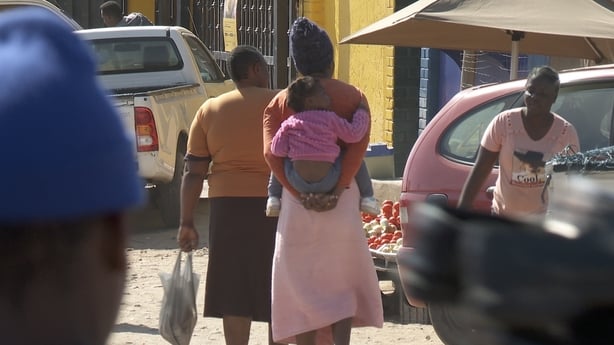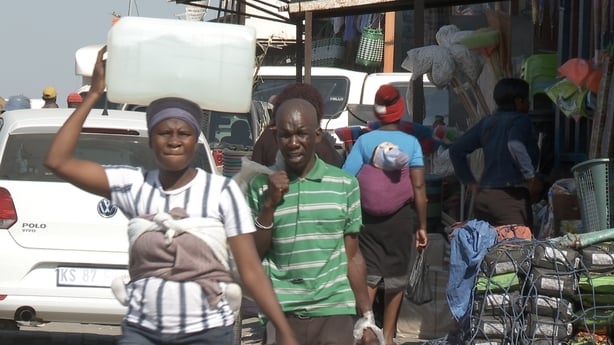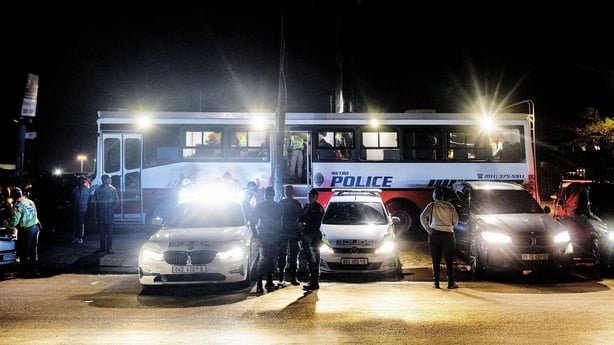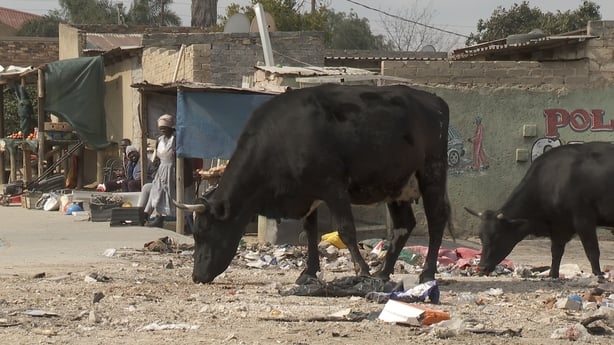The notorious township of Diepsloot has one of South Africa's highest crime rates. Situated outside Johannesburg, it is a dense labyrinth of tin shacks stacked along the slopes of a wide valley.
Almost half a million people are crammed into just 10 square kilometres of dusty streets. With unemployment running at a staggering 70%, fewer than one in three people has a job, and the absence of a consistent police presence has ceded control of the streets to local gangs.
Diepsloot lacks basic services, and its crumbling infrastructure coupled with the lack of any prospects have created an ideal environment for rampant crime.

Rates of gender-based violence (GBV) are particularly high. While the abuse of women is widespread across South Africa, rape, assault and murder continue to rise.
But the official crime statistics only tell a fraction of the story. A culture of shame and secrecy prevents many women from reporting their abusers to the police, leaving them isolated and vulnerable.
I meet Leah at her humble home in the heart of the township. She suffered years of abuse at the hands of a controlling partner.
"There were times I feared I would die. When that person comes in through the door, you start thinking what is it for you today," she says.
"I was experiencing a lot, and it was painful to realise that I was going through a hell of relationship," Leah recalls. "I got sick. When I got sick I went to the clinic. That was where they diagnosed me, that I had a depression."

Leah found the strength to seek help. Entering the Green Door Women's Refuge, she received counselling and advice. Leah eventually managed to leave the abusive relationship, putting all her energy into healing herself and raising her two daughters.
Brown Lekekela set up the Green Door shelter in his backyard 14 years ago as a place of safety and support for victims of GBV. The service offers emergency accommodation, counselling and referral services to victims. The facilities are extremely basic but they offer a lifeline to desperate women.
"Our funding is small and comes from corporate and private donations. We have no state-funding or steady stream of income," he says.
"We can look after about 10 to 16 women here but the demand is much higher. Without the funding we can't help everyone."

Supported by Irish Aid, the likes of Sonke Gender Justice provides abused women with care, counselling and legal supports. It also implements a community education programme in Diepsloot, but Dumisani Rebombo, the centre's manager, says that much more is needed to address the problem of gender-based violence.
"Education helps but it is only part of the solution. There are structural problems here which cannot be left to an individual organisation or NGO to deal with alone. We need duty bearers. In this case it’s the government."
"For example, we have eight communal toilets in Diepsloot but no public lighting on the streets", he says. "How can women feel safe using these facilities after dark? We need proper investment in the communities here."
Sonke volunteer, Thandekile, says there is a growing awareness amongst women of the supports available but that there is still a reluctance to report abusers to the police.
"It’s part of the culture here, a culture of dependency. The man is seen as the provider and the woman and her children rely on him. He is the one working and earning money for the family. Because of this the woman is afraid to speak out against abuse, she is trapped."

Official police statistics tell us that in the first three months of this year, 10,512 women were raped in South Africa and 969 were killed. The number of women assaulted stood at 15,000. However, those figures only represent the number of crimes reported to police. Actual rates of GBV are believed to be significantly higher.
Dumisani Rebombo says that a more concerted effort is required to tackle the issue.
"We need accountability mechanisms in the police to ensure that reports of abuse will be investigated and prosecuted properly. We have a groundswell of corruption in state services which we need to nab."
"We need all agencies, all NGO who work in places like this, dealing with various issues, we need them to carry out their work through the lens of gender based violence."
"One thing that is changing – people have more capacity to seek their rights and we need to put more effort in to generating that awareness."
Women continue to suffer in these townships - killings and instances of rape remain exceptionally high - but there is a sense of a growing empowerment amongst women here. Survivors like Leah carry a message of advice and hope.
"Do not wait to be killed. Seek help. Since I decided to leave my partner I felt like a weight is off my shoulders. Now I’m in a new world. The old is gone. Now I am a new person."






